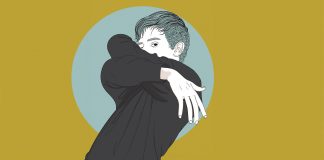COVID-19: Crisis prayer and the crisis of our prayers
I was descending from Omu Peak, in the Bucegi Mountains, with a few dozen young people. It had not been an ideal hike, and we were behind schedule. The forest made the darkness even thicker as it began to cover the mountain, and slowly, our minds as well.
Cures for loneliness
We live in a time in history when we seem to be connected in every way possible. It seems as if there are few, if any, who have no one to socialize with.
We are not creators, but inspirers and witnesses
It is not we who educate our children, they educate themselves. Unique, complete, amazing. Every child and every childhood is a challenge to discover and respect their individuality. Let's enjoy the revelations they give us and grow ourselves by observing and facilitating their growth.
The sad people at the circus
At night, the main boulevard in Las Vegas is so crowded that in order to move forward you actually have to push your way through the motley crowd. People of all kinds fill the space already suffocated by the construction conglomerate, which is equally diverse.
Free to be responsible
Several simple experiments have shown that certain neural processes that are activated when performing an action increase in intensity with fractions of a second or even whole seconds before conscious thinking is informed about the performance of that action.
Stories for adults and hidden messages in children’s fairy tales
Children's books and cartoons contain more than just life lessons and morals such as "good always triumphs over evil". Some have political, social, and historical connotations, while others contain subliminal messages with sexual, discriminatory, or even malicious undertones.
How would God want a person to live on any given day?
Living one day according to God's plan is a good idea to start with. But learning to live in such a way every day is something else.
Get your brain in shape
For a long time we’ve exercised for our physique. But studies are showing more and more the mind-blowing benefits exercise has on our brains.
Tutorial: How to easily spot fake news
In an interview published by Inc.com, 24-year-old Romanian Ovidiu Dobrota, from Oradea, Romania, boasted that his fake news site Ending The Fed had a substantial impact in supporting Donald Trump in the presidential elections. According to a Buzzfeed analysis, his boasting is well-founded.
Are we ready for an “imminent” global water crisis?
By 2030, global demand for fresh water will exceed supply by 40%. A global water crisis looms on the horizon as the world continues its reckless run of "vampiric overuse," warns a new United Nations report.
The Sabbath, between original intention and everyday utopias
"Western societies have transformed Sundays into days where leisure activities have eclipsed the traditional Christian meaning of the day—to devote time to God", Pope Benedict XVI once said, reminding us that the day of rest is a celebration of God's creation of the world. Observing this day now, when there are worrying signs about the global climate, is a necessity, the Pope added.
Ship your grain across the sea…you may receive a return
When we help someone without expecting anything in return, we often forget both the recipient and the gift. But God does not forget, and fulfils—at just the right time—the promise found in the verse that provides the title of this article. He did the same in my case.
Adolescence: a generational Tower of Babel
Adolescence is not a series to watch with your teenage child, but it is a series that may cause mature viewers to re-evaluate their relationship with their own children, as well as their relationship with their parents.
Don’t have grandkids? Get some! | The surprising perks of being a grandparent
Grandparents who play an active role in the lives of their grandchildren enjoy a range of health and well-being benefits—including, according to research, a longer and happier life.


























